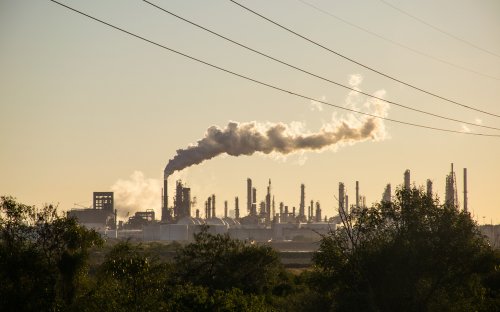While oil and gas will be part of the energy mix in 2050, the market is moving towards decarbonisation faster than regulators – argues fossil fuels expert Chris Gidez.
Washington (Brussels Morning) “A New Green Deal” was a term branded by the New Economics Foundation (NEF) in the UK as the economic crisis was unfolding. At the time, the NEF was calling for public investment in green energy and transport infrastructure as an instrument to reset the economy and contain climate change, a concept that received great endorsement. The press saw in the Obama Administration the possibility of a turning point in global environment and economic governance.
This hope was echoed by the United Nations Environment Program with the launch of the “Global Green New Deal” initiative in October 2008. Multilateral action against climate change took off during the two successive Obama Administrations – leading to the 2015 Paris Climate Accord – although more in terms of regulation than investment. The Trump administration was then seen as a big comeback for the oil and gas industry.
In 2019, however, the call for a Green New Deal in the US gained new prominence, with over 90 metropolitan centres committing to “net-zero” emissions despite the move of the federal government in the opposite direction. Meanwhile, in November 2019, the European Commission put forward a Green New Deal Action Plan, creating a rift between the two sides of the Atlantic.
The coming to office of President Biden has been seen as yet another policy turn, as he advocates for a ‘Clean Energy Revolution’. But is that possible? The oil and gas sector continues to be a force to be reckoned with in Washington. To discuss the policy transition, Brussels Morning talks to oil and gas insider, Chris Gidez, with 30 years in the industry in communications at Texaco, Chevron and Caterpillar and running the G7 Reputation Advisory.

Ambassador Tedo Japaridze (TJ). Europe’s Green New Deal is quite ambitious in reducing fossil fuels reliance. The objective is 55% lower emissions by 2030 and carbon neutrality by 2050. This in part means reducing oil imports by 23-25%, and natural gas by 13-19% over the next decade. Given that China is moving in the same direction, do you feel Washington’s bubble is waking up to the forthcoming transformation? Do you foresee policy coordination or a clash of world views on the two sides of the Atlantic?
Chris Gidez (CG). Far more important than any shift in the political winds In Washington was the January announcement by General Motors that it intends to eliminate gasoline and diesel cars from its fleet by 2035 and embrace electric vehicles. There is no question that all the other auto manufacturers will follow suit in one fashion or another.
According to the US Energy Information Administration, consumption of gasoline (petrol) accounts for about 45% of total US petroleum consumption.
Think about that.
One of the biggest players in the auto sector just moved to completely upend its own market, and in so doing is also forcing a tectonic shift in petroleum demand over the next generation, with all the associated consequences to greenhouse gas emissions, not to mention the outlook for oil companies.
While it is too soon to write the obituary for the internal combustion engine, all the oil companies are now asking the same question: “How do we stay relevant.. for our customers, for our shareholders?”
I think what we are seeing among the European-based oil companies is a realisation that they cannot wait for policymakers in individual countries to reach a consensus on the best path toward wrestling the climate risk to the ground.
By way of example, according to Bloomberg, five European companies account for 51% of all renewable energy assets held by the world’s 39 largest oil and gas producers. American oil companies – along with US lawmakers — are being forced into a game of catch-up.
TJ. Perhaps due to the Koch brothers, there is a sense that the Republican Party is putting its weight behind fossil fuels while Democrats are more willing to entertain energy diversification. Do you feel this ‘cowboys and Indians’ perception of energy lobbying politics reflects reality?
CG. I think it is too simplistic to think that the climate debate in the US is just a split between party affiliations. There are regional, demographic, economic, cultural and generational contributors as well.
I recall participating in a meeting with a European-based oil company several years ago where a senior executive was lamenting over the pace of progress toward energy transition.
I was part of the generation of entry-level employees who joined the company in the late 1980s when there was so much discussion of alternative energy. Now fast forward and all those entry-level workers are now assuming positions of leadership and wondering what happened to those promises?
However, where political parties have failed is allowing the climate debate to become an ideological debate, not unlike debating religion. (I once had a senior public policy executive of a US oil company tell me that environmentalists were nothing more than communists in disguise!).
Ideology is not fact-based, but the climate solution must be fact-based.
Because public opinion in the US continues to suggest that climate change is seen as an abstract risk (important, but not that important), this polarisation, together with more pressing front-burner issues, has led to paralysis in policy-making. Lawmakers have been kicking the can for many years.
Unfortunately, many in industry – notably within the oil and gas sector – have also seen the climate debate as an ideology debate, which has coloured their response. By looking at the climate issue through the prism of ideology both lawmakers and the private sector have squandered precious time through squabbling and the demonisation of those who hold differing views.
I think we are seeing now leadership in the private sector decide they cannot wait for policy makers to map out a path, and they are reacting to their best understanding of the direction of the marketplace. How quickly companies adjust to this transition will determine whether those companies will be around in the future.
This is not to suggest that government does not have a role to play in addressing the climate change threat. It most certainly does. But the market seems to be moving at a faster pace than lawmakers, at least in the US.
TJ. Norway’s Government Pension Fund – also known as the Oil Fund – is no longer allowed to invest in fossil fuels, including the Norwegian petroleum sector. Are US corporates taking note of this development and, if so, are they following parallel strategies, or does the fossil fuel sector still have a bright future in America?
It is fair to say that investors are driving change in the oil and gas sector more than lawmakers or consumers, and it is not just the pension funds (which often act as social activists) driving that change.
Investors are beginning to punish companies seen as being slow to move toward an energy transition strategy, and U.S. companies are seen as being slower than their European counterparts.
For instance, for its most recent reporting cycle, Black Rock, the world’s largest asset manager, voted on 55 occasions against management on director-related items for insufficient progress on climate disclosures. As Black Rock puts it succinctly, “climate change is an investment risk”.
But it will not just be investors that will force change on the oil industry. The insurance sector is taking notice. According to the consulting firm McKinsey, “The projected escalation of climate risk, such as the occurrence of more floods and wildfires, may lead to underinsurance — or to no insurance at all. The result, substantial market dislocation will include premium loss, higher rates of self-insurance and an increased demand for disaster relief from the public sector.”
In short, the squeeze from investors and insurers poses a grave threat to oil companies. “Big Oil” can no longer afford to see climate as an ideological battle. It is about the almighty dollar as much as it is about the atmosphere.
TJ. Some environmental NGOs and climate activists insist on the dissolution of the oil industry and an outright prohibition of fossil fuels. Is that realistic or even wise?
CG. Civil society is a very large basket with a diverse set of interests and expectations. So, it is not fair to lump all NGOs together as if they were a monolith.
There is a divergence between the US and Europe on how they are perceived. At the risk of making broad generalisations, while in Europe it is commonly accepted that NGOs have a legitimate right to a seat at the table, that view is not as consistently accepted in the US. There are still pockets within the private sector who see NGOs as interlopers, and I recall one instance in which a general counsel of a Fortune 100 company wanted to ban the use of the term “stakeholders” as he did not want to legitimise the role of NGOs.
One of the great mistakes of all parties in the 30 years of climate debate has been the effort to demonise each side, and to frame the debate as a conflict. As we know, by definition conflicts must have winners and losers. The rhetoric in the US has gotten so bad that some politicians have called for the criminal prosecution of oil industry executives simply because they worked for an oil company which extracted and refined oil – in accordance with all laws and regulations.
While the political temperature of the climate debate in Europe may not be as heated as it is in the US, it is still counterproductive to achieving a practical set of solutions. One example of the unhelpful nature of conflict is the growing trend of trying to affect public policy and punish oil companies through climate litigation.
As frustrating as it is to push the string of public policy or encourage corporate change, litigation is an inadequate substitute as a tool to move the public and private sector toward a solution. Not only will it cause a delay of years or even decades, litigation is also piecemeal, and it simply compounds the existing conflict. Most important, there is scant evidence that litigation is effective.
As in international politics, there are two ways to resolve a conflict or disagreement: battle or diplomacy. And effective diplomacy means lowering the political temperature at the negotiating table. When it comes to the climate debate, industry, civil society and politicians ought to keep this in mind.
As I said earlier, it is too soon to write the obituary for oil and gas. There will be a continued role, if for no other reason is the need for transition.
Historically, the energy landscape has not been diverse: largely fossil fuels, hydropower and nuclear. If I were to make a guess, that landscape a half-century from now will resemble a mosaic with many tiles: renewables of all sorts, alternatives, a resurgent nuclear industry and – yes – oil and gas.




